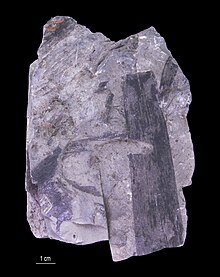Cordaites is an important genus of extinct gymnosperms, related to or actually representing the earliest conifers. These trees grew up to 100 feet (30 m) tall and stood in both dry areas as well as wetlands. Brackish water mussels and crustacea are found frequently between the roots of these trees. Cordaites fossils are most commonly found in rock sections from the Upper Carboniferous (323 to 299 million years ago) of Europe and the Americas.
| Cordaites Temporal range:
| |
|---|---|

| |
| Fossil bark of a Cordaites sp | |
| Scientific classification | |
| Kingdom: | Plantae |
| Clade: | Tracheophytes |
| Clade: | Gymnospermae |
| Division: | Pinophyta |
| Class: | Pinopsida |
| Order: | †Cordaitales |
| Family: | †Cordaitaceae |
| Genus: | †Cordaites Unger |
| Species[citation needed] | |
| |

A number of many noteworthy types from this line are:
- Cordaites principalis
- Cordaites ludlowi (named after Ludlow, a coal area in England)
- Cordaites hislopii. Found in Paleorrota geopark in Brazil.[1]
In contrast to many other plants, fossilized Cordaites seeds are not rare, because they are rather large (up to 10 mm); those seeds are named Cordaicarpus.
References
edit- ^ Karen Adami-Rodrigues; Paulo Alves De Souza; Roberto Iannuzzi & Irajá Damiani Pinto (2004), "Herbivoria Em Floras Gonduânicas Do Neopaleózoico Do Rio Grande Do Sul: Análise Quantitativa" (PDF), Revista Brasileira de Paleontologia, 7 (2): 93–102, doi:10.4072/rbp.2004.2.01
External links
edit- https://www.uni-muenster.de/GeoPalaeontologie/Palaeo/Palbot/seite18.html
- https://web.archive.org/web/20061109132122/http://museum.gov.ns.ca/fossils/gallery/specimen/967206.htm
- http://www.xs4all.nl/~steurh/engcord/ecordai.html
- Image of a Cardiocarpus fossil